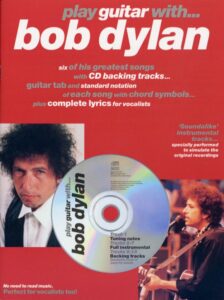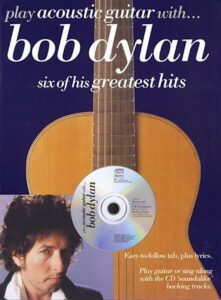Come join us now, and enjoy playing your beloved music and browse through great scores of every level and styles!
Can’t find the songbook you’re looking for? Please, email us at: sheetmusiclibrarypdf@gmail.com We’d like to help you!
Table of Contents
Bob Dylan – Blowin’ In The Wind – arr. for Guitar (sheet music)
Bob Dylan

(Robert Allen Zimmerman; Duluth, United States, 1941) American folk and rock singer and songwriter, one of the great figures of contemporary music, whose musical production made him a benchmark among singer-songwriters. His admiration for the poet Dylan Thomas led him to adopt the artistic surname by which he became popular.
In the 1960s, he created his own style based on the recovery of folk music, to which he added lyrics loaded with symbolism and demands, which made him a leader for the rebellious youth of his country.
Songs like Blowin’ in the Wind, Maters of war or Talkin’ World War III blues revolutionized world pop and opened new paths for both singer-songwriters and rock bands. In 1965, he turned to electric instruments and began a series of abrupt turns, both stylistic and spiritual, which earned him much criticism from the most purist followers of folk.
After a long period of record silence, he drew attention again with a compilation work recorded live and without electric instruments, Unplugged (1995). Some of his most notable albums are The freewheelin’ Bob Dylan (1963), Blood on the tracks (1975) and Oh mercy (1989), while Love and theft (2001) and Modern times (2006) are among his last albums. Nominated several times for the Nobel Prize in Literature, he received the coveted award in 2016.

Biography
Robert Allen Zimmerman, better known as Bob Dylan, was born in Duluth, Minnesota (United States) on May 24, 1941. From childhood he showed great interest in music and poetry. He lived in a rural setting and experienced traditional American music of European origin firsthand.
In 1959, he began studying at the University of Minnesota, where he came into contact with so-called folk music and protest song. He frequented nightclubs where music was performed and soon began to perform there. Also, he spent more time singing and playing guitar and harmonica than studying.
It was then that he adopted his stage name, in homage to the American poet Dylan Thomas. Bob Dylan dropped out of college for good and, determined to devote himself entirely to music, moved to New York in 1961. There he began to sing in the cafés of Greenwich Village, where folk fans gathered. The young singer caught the attention of the most important figures of the genre, whom he admired and who soon considered him one of their own.
With their guitars, banjos, drums and harmonicas, the folk singers of the 1960s went hand in hand with the expansion of the civil rights and anti-Vietnam War movements. Musicians like Pete Seeger, Peter, Paul and Mary or Joan Baez, generally committed white middle-class and urban young people, were convinced that with songs they could combat commercialism, hypocrisy, injustice, inequality and war.
Bob Dylan also transmitted messages with his highly poetic content that gave a new meaning to popular music. His protest songs not only reflected people’s feelings towards contemporary issues, but created them, earning him the title of the voice of his generation.
A laudatory review that appeared in The New York Times opened the doors of the record market for him: Columbia Records offered him to record his first album, titled Bob Dylan (1962). In this first vinyl he alternated songs from the folk and blues repertoire and included two of his own songs.
Bob Dylan was well received by critics and the public and already showed the essential characteristics of his style: a mixture of the different popular American musical traditions (especially folk of European origin and African-American blues) and great importance of the lyrics of the songs. .
In 1963, Bob Dylan’s second album, The Freewheelin’ Bob Dylan, was released and was a huge hit. Among the songs that this album contained, Blowin’ In The Wind stands out, soon becoming a true generational anthem. This song was sung in the pacifist demonstrations and in favor of the civil rights of the African-American population, and was quickly translated into various languages.
Bob Dylan had become a figure of international projection. His third album came in 1964 and the title, which is also the title of one of the songs it contains, expresses the feeling of an era: The Times They Are A-Changin’; that is, Times are changing.
Dylan’s image as a committed singer-songwriter and major figure in protest song changed with his next album, released in 1965 and titled Highway 61 Revisited, which included the song Like a Rolling Stone. This song, an authentic exponent of genuine rock-and-roll, marked the beginning of the rocker Dylan, although he did not stop giving great importance to the lyrics.
At the Newport Folk Festival, to the surprise and disgust of the public, he performed accompanied by an electric guitar and amplifiers: he would not be invited again. What Dylan was doing was revolutionizing the idea of folk music, expanding its possibilities. On June 1, 1966 he conquered Europe from the Olympia in Paris. On July 29 of this year he suffered a motorcycle accident, after which he disappeared from public life for two years.
In 1970, the film The Price of Failure was released, directed by Sidney J. Furie and with a soundtrack by Bob Dylan. Three years later, a new film with music by Dylan, Pat Garrett and Billy The Kid, directed by Sam Peckinpah and in which the singer played a small role, came to the big screen. In 1975 he shot his only film as a director, Renaldo y Clara, and three years later he appeared in a documentary signed by Martin Scorsese entitled The Last Waltz.
For this latest work, the American director based himself on the historic farewell concert of The Band, the group that between the mid-1960s and the mid-1960s accompanied Bob Dylan in many of his recitals. The concert took place on Thanksgiving Day in Winterland, San Francisco, and featured, in addition to Dylan and The Band, notable musicians such as Eric Clapton, Neil Young, and The Beatles drummer Ringo Starr, among others.
Dylan’s songs from the 1980s respond, for the most part, to his religious concerns, and his lyrics take on a remarkable depth. He was not then experiencing the moment of his greatest popularity, although his twenty-five-year musical career did not overlook his record label or the public. Thus, in 1985 a quintuple anthology album, Biograph, appeared, containing unreleased versions of some of his songs.
Bob Dylan was for years a generational reference, and there came a time when the texts of his songs began to seriously interest the intelligentsia of the time. The great poet of the beat movement Allen Ginsberg did not hesitate to show his admiration for Dylan, referring to him as ‘an important American bard of the 20th century whose texts have influenced generations around the world, earning him a Nobel Prize’.
In fact, since 1996 and year after year, the writer and literature professor Gordon Ball would nominate Dylan for this important award, and the first time he did so at the request of Ginsberg, who died in 1997.
In 2006, he received two new Grammy Awards for Modern Times, an album released that same year and awarded the best contemporary folk album. He also received for one of the songs on this work, Someday Baby, recognition as best rock soloist.
Dylan was for years a generational reference, and there came a time when the texts of his songs began to seriously interest the intelligentsia of the time. The great poet of the beat movement Allen Ginsberg did not hesitate to show his admiration for Dylan, referring to him as ‘an important American bard of the 20th century whose texts have influenced generations around the world, earning him a Nobel Prize’.
In fact, since 1996 and year after year, the writer and literature professor Gordon Ball would nominate Dylan for this important award, and the first time he did so at the request of Ginsberg, who died in 1997.
In recent years, Dylan has participated in the soundtrack of new films such as Fear and Loathing in Las Vegas, by Tery Gilliam (1998), and Anonymous, by Larry Charles (2003), in which he also appeared as an actor playing an old woman glory of music locked up in prison. But his life and his work have also interested important film directors, such as Martin Scorsese, who in 2005 made a documentary called No Direction Home.
Two years later, a film in which Dylan did not directly intervene but was based on his life, I’m Not There, directed by Todd Haynes, came to the big screen. The film, which had the approval of the artist, was presented at the Venice International Film Festival in August 2007.
If Bob Dylan was missing something to finish forging his legend, it was the publication of his autobiography. Chronicles Volume One was released in 2004 and was an international literary event. In June 2007, the Prince of Asturias Award for the Arts was awarded to the singer. Candidates included composer Andrew Lloyd Weber, architects Frank Gehry and Rafael Moneo, as well as pianist Maria João Pires.
The jury decided on Dylan for his status as a ‘living myth’ and for having been ‘the beacon of a generation that had the dream of changing the world.’ ‘The austerity in the forms and the depth in the messages’ was underlined in the songs of the American musician.
The singer-songwriter was one of the great absentees at the awards ceremony, on October 26 at the Campoamor Theater in Oviedo. He sent, however, a brief message in which he thanked the award. That same month, a retrospective of his work was published on three compact discs that collected more than forty years dedicated to music. A few days before, Dylan had attended a Yom Kippur, the Day of Atonement, celebration at an Atlanta synagogue. There he prayed and publicly showed his return to Judaism from his family origins.
